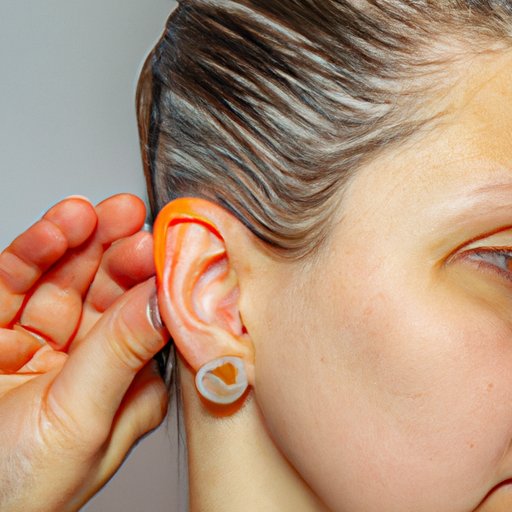
Introduction
Fluid in the ears is a common problem that can cause discomfort and even affect hearing. It can occur due to various reasons like allergies, infections, etc. The good news is that there are several remedies and prevention tips that can help alleviate this condition. In this article, we will explore some practical home remedies and prevention tips that you can use to get fluid out of ears naturally.
Causes of Fluid in Ears
Fluid in ears often occurs due to an imbalance between the amount of fluid produced and the amount that is drained out. Some of the common causes of ear fluid include:
- Allergies
- Colds and flu
- Sinus infections
- Change in atmospheric pressure
- Excess mucus production
Fluid can also get trapped in the ear canal due to factors like earwax buildup, trapped water, ear infections, etc. When fluid accumulates in the middle ear, it can cause pain, temporary hearing loss, dizziness, and other symptoms.
Home Remedies to Get Fluid Out of Ears
Here are some effective home remedies to get rid of fluid in ears naturally:
- Warm Compress: Applying a warm compress can help relieve ear pain and promote fluid drainage. Take a clean cloth and soak it in warm water. Squeeze out the excess. Place the cloth over the affected ear for 5-10 minutes. Repeat this process several times a day until you get relief.
- Saline Solution: A saline solution can help flush out excess fluid from the ear. Mix 1 teaspoon of salt in 1 cup of warm water. Dip a cotton ball in this mixture and squeeze a few drops into the ear. Tilt your head to one side and let the solution drain out. Repeat this process 2-3 times a day.
- Hydrogen Peroxide: Hydrogen peroxide can help remove excess earwax and any trapped water or debris in the ear. Mix equal parts of 3% hydrogen peroxide and water. Use a dropper to pour a few drops of this solution into your ear. Let it sit for a minute, then tilt your head to let the mixture drain out. Repeat this process once a week.
- Herbal Steam: Inhaling steam can help loosen up any mucus or congestion in the ear. Boil a pot of water and remove it from the stove. Add a few drops of essential oil like tea tree oil, or eucalyptus oil to the water. Drape a towel over your head and hold your face over the bowl, breathing in the steam for about 10 minutes. Repeat this process once or twice a day.
- Valsalva Maneuver: This technique can help open up the Eustachian tube and equalize the pressure in the ears. Pinch your nose and gently blow air out through your nose. Repeat this process several times a day.
Over-The-Counter Remedies for Fluid in Ears
If home remedies do not work, you can try over-the-counter remedies. Here are some remedies that we recommend:
- Decongestants: Over-the-counter decongestants like pseudoephedrine can help relieve the congestion that contributes to fluid buildup in the ear. These medications can cause side effects like drowsiness, increased heart rate, and high blood pressure. Therefore, it is important to use them as directed.
- Antihistamines: Antihistamines can help reduce inflammation and swelling in the sinuses and nasal passages. This, in turn, can reduce fluid buildup in the ears. However, these medications can cause drowsiness and other side effects.
- Pain Relievers: Pain relievers like acetaminophen or ibuprofen can help alleviate ear pain and discomfort. These medications can cause side effects like stomach upset, dizziness, and increased bleeding risk. So, Use pain relievers judiciously.
When to Seek Medical Attention for Fluid in Ears
It is important to seek medical attention if you experience any of the following symptoms:
- Severe ear pain that lasts more than a day
- Fever
- Loss of hearing, especially if it is sudden
- Dizziness or balance issues
- Ear drainage
Your doctor may prescribe medications like antibiotics or nasal corticosteroids to help alleviate the condition. If the fluid in the ear does not respond to treatment, the doctor may suggest getting ear tubes inserted to help drain the fluid.
Prevention Tips for Fluid in Ears
Here are some prevention tips to minimize the risk of developing fluid in the ears:
- Avoid exposure to cigarette smoke
- Wash your hands frequently to avoid the spread of germs
- Use earplugs when swimming or bathing
- Blow your nose gently to avoid pushing mucus into the ears
- Avoid manipulation of the ear canal, and refrain from inserting objects into ears for cleaning
How to Relieve Pain and Discomfort Caused by Fluid in Ears
If you experience pain or discomfort due to fluid in the ears, here are some ways to relieve it:
- Apply a warm compress to the ear
- Take pain relievers like acetaminophen or ibuprofen
- Use a humidifier or vaporizer to moisturize the air
- Avoid lying on your side as this can increase pressure in the ear
- Chew gum or yawn frequently to help equalize pressure in the ear
Conclusion
Fluid in the ears is a common condition that can cause discomfort and temporary hearing problems. Fortunately, there are several home remedies you can use to get rid of fluid in the ears, along with some prevention strategies to minimize the risk of developing this condition. Remember, if your symptoms persist or worsen, it’s important to seek medical attention to rule out underlying conditions.





